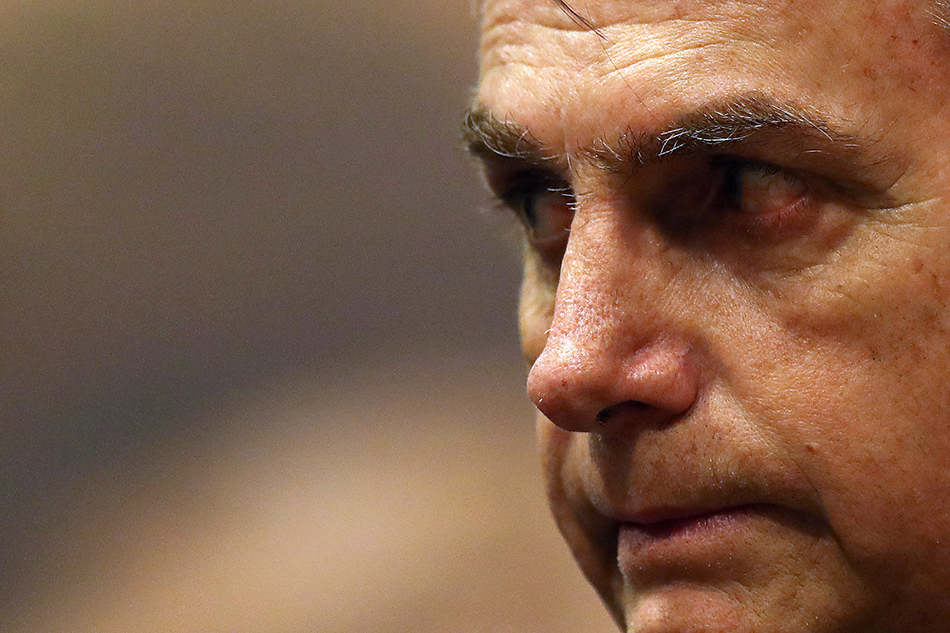Presidential candidate Jair Bolsonaro's anti-China sentiment has Beijing nervousBy Jake Spring
BRASILIA - The Chinese government is trying to make peace with Brazil's leading presidential candidate, Jair Bolsonaro, whose China-bashing threatens to chill a profitable trading relationship.
Chinese diplomats based in Brasilia have met twice with top Bolsonaro advisors in recent weeks, according to participants in the meetings.
Their aim is to highlight cooperation with Latin America's largest country, whose grain and minerals have fueled China's rise.
Mr Bolsonaro has portrayed China as a predator looking to dominate key sectors of its economy.
With its own economy slowing, China cannot afford to become embroiled in another costly trade war like that which has erupted between Beijing and Washington.
Two-way trade between China and Brazil stood at $75 billion last year, according to Brazilian government statistics.
China has invested $124 billion in Brazil since 2003, mostly in the oil, mining and energy sectors. China is eager to bankroll railway, port and other infrastructure projects here to speed the movement of its Brazilian grain.
But the patriotic Bolsonaro, much like U.S. President Donald Trump, has criticized China repeatedly on the campaign trail, saying the Chinese should not be allowed to own Brazilian land or control key industries.
An ardent nationalist, Mr Bolsonaro is expected to win a landslide victory in balloting this Sunday.
"The Chinese are not buying in Brazil. They are buying Brazil," Mr Bolsonaro has warned repeatedly.
Companies in the crosshairs include China Molybdenum Co Ltd, which bought a $1.7 billion niobium mine in 2016 that Mr Bolsonaro says Brazil should develop itself.
Niobium is used as an additive to steel to make it stronger and lighter.
It is used in cars, buildings, jet engines and a host of other applications.
Brazil controls about 85 percent of the world's supply and Mr Bolsonaro wants his nation to reap the benefits.
Mr Bolsonaro is also on record opposing a planned privatization of some assets of state-owned utility Centrais Eletricas Brasileiras SA (Eletrobras) on concerns that Chinese buyers would win the bid.
Officials at China Molybdenum declined requests for comment.
But six senior executives at Chinese companies operating in Brazil told Reuters they were watching Mr Bolsonaro's remarks with varying degrees of concern.
"We are worrying a bit about some of his extreme views," one Chinese infrastructure executive told Reuters.
"He is on guard against China."
Bolsonaro's friendly leanings toward Taiwan are likewise vexing to Beijing.
Mr Bolsonaro in February became the first Brazilian presidential candidate to visit Taiwan since Brazil recognized Beijing as the sole Chinese government under the One China policy in the 1970s.
The Chinese embassy in Brazil issued a letter condemning Mr Bolsonaro's Taiwan trip as an "affront to the sovereignty and territorial integrity of China."
Mr Bolsonaro's combative stance is in stark contrast to the rest of Latin America, whose leaders have welcomed Chinese investment, loans and commodities purchases.
And it could eventually put him at odds with Brazil's powerful farm and mining industries, for whom China is an indispensable customer.
Shares of Brazilian miner Vale SA, for example, the world's largest iron ore producer, hit an all-time high last month on strong Chinese demand for its high-quality ore.
Brazil's farm sector, meanwhile, has reaped the benefit of China's feud with President Trump.
Beijing has sharply reduced purchases of American soybeans, filling the gap with Brazilian grain. Brazilian exports of soy to China are up 22 percent by value this year with about 80 percent of its soy shipments now destined there.
The U.S.-China trade war has given Brazil leverage for now.
 Presidential candidate Jair Bolsonaro attends a news conference in Rio de Janeiro, Brazil October 11, 2018.
Presidential candidate Jair Bolsonaro attends a news conference in Rio de Janeiro, Brazil October 11, 2018.
PRIVATE MEETINGS
Chinese diplomats met with Mr Bolsonaro's top economic advisor Paulo Guedes in early September to discuss the importance of the bilateral relationship, Qu Yuhui, Chinese Minister-Counselor at the embassy in Brasilia, told Reuters on Monday.
Guedes was offered a trip to China to strengthen his knowledge of the world's second-largest economy, Qu said.
He said Chinese diplomats made it clear they would like to meet Mr Bolsonaro in person, although no meeting has been set.
"Regardless of right- or left-wing, we want to talk and advance the smooth development of China-Brazil relations," Qu said.
Guedes did not respond to requests for comment.
Last week Reuters spotted Qu and another Chinese diplomat entering the offices of Congressman Onyx Lorenzoni, Mr Bolsonaro's campaign manager, proposed chief of staff and the organizer of the candidate's Taiwan trip.
Qu declined to comment on the matter.
Lorenzoni said he met with two Chinese diplomats and that there would be further talks after the election.
He said China is a vital partner and the two countries would maintain good relations.
If elected, Mr Bolsonaro's first major meeting with the Chinese would come early in his presidency. Brazil hosts the BRICS summit in 2019, an event that Chinese dictator Xi Jinping is likely to attend.
'BUYING BRAZIL'
Mr Bolsonaro is content with China purchasing commodities.
But the former Army captain is wary of the Asian nation's recent shopping spree in Brazil's energy and infrastructure sectors.
China Three Gorges Corp paid 4.8 billion reais ($1.48 billion) in 2016 to operate two of Brazil's largest dams.
Last year, State Grid Corp of China bought a controlling stake in Sao Paulo's CPFL Energia SA and a subsidiary for 17.36 billion reais ($4.90 billion), while China's HNA Airport Holding Group Co Ltd bought a controlling stake in Brazil's second-busiest airport.
Brazil is now expected to put a number of government concessions and assets up for bid next year, including railways and state-held energy assets.
The outgoing administration of Brazilian President Michel Temer has attempted to privatize state-controlled energy company Eletrobras, a move which requires congressional approval.
Mr Bolsonaro has said he is against selling Eletrobras generation assets because it would "leave Brazil in Chinese hands."
The Chinese infrastructure executive said his company was worried that Mr Bolsonaro might change the government auction rules to disadvantage Chinese bidders.
He and other Chinese executives who spoke to Reuters declined to be identified.
To date, Mr Bolsonaro has been vague about how he would carry out actions to stop Chinese investment he sees as undesirable.
Brazil has no equivalent of the U.S. Committee on Foreign Investment, which reviews the national security implications of foreign investment in American companies.

 Presidential candidate Jair Bolsonaro attends a news conference in Rio de Janeiro, Brazil October 11, 2018.
Presidential candidate Jair Bolsonaro attends a news conference in Rio de Janeiro, Brazil October 11, 2018.